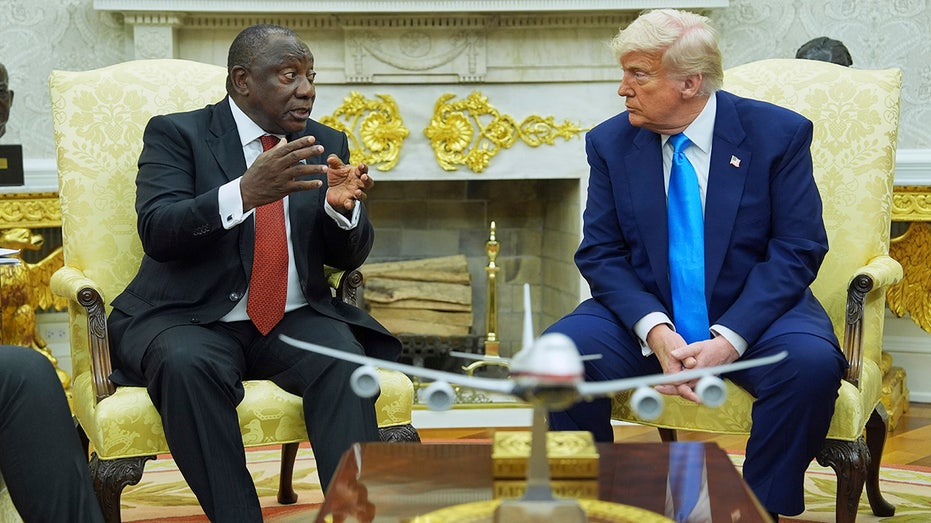The largest Democratic fundraising platform has found itself in President Donald Trump’s crosshairs. And its CEO is coming out against the “authoritarian” tactic — while acknowledging ActBlue needs to “build some new muscles” to fight back.
Trump signed a presidential memorandum last month ordering Attorney General Pam Bondi to investigate the use of online fundraising by foreign actors to make so-called “straw donations” influencing American elections. ActBlue, by far the largest online fundraising platform for Democrats, was the only one named in the memo.
"We almost were in a, ‘This can't be real, this can't be serious. These are not serious people, these are not serious allegations,’” Regina Wallace-Jones, ActBlue’s CEO, said in an interview with POLITICO. “And instead held on for a very long time to our traditional posture."
That posture was to stay out of the spotlight even as the platform has faced increased scrutiny, and accusations of fraud, from Republicans for years. House Republicans have been investigating ActBlue over a range of fundraising practices since 2023, and that probe remains ongoing. An interim report released by the committee weeks before Trump’s memorandum accused ActBlue of allowing donation fraud, though its only examples of attempted fraud were those identified by the company itself in internal documents.
Now ActBlue has realized it can no longer keep a low profile. Wallace-Jones, who took the helm at ActBlue in early 2023, appeared on MSNBC in April when the Trump memorandum first came out, and has made the media rounds in recent weeks, doing interviews with Pod Save America and activist Aaron Parnas. And she told POLITICO that — while she’s confident investigations into ActBlue will lead “nowhere” — she now sees the need to tell the public more about what ActBlue actually does. That new stance puts the fundraising platform in rarefied company – one of the few progressive forces fighting against administration policies instead of acquiescing to its demands.
“It's only now that we are taking the position that our silence is actually hurting the perception of who we really are,” Wallace-Jones said. “And so could we have been more vocal sooner? Sure.”
The following interview has been edited for length and clarity.
What was your reaction to the president’s memorandum?
This is something that was not expected. But it was also unsurprising in the sense that there has been a slow crescendo from grassroots individuals all the way up through various legislative bodies, on the Republican side to look at ActBlue.
We are an organization that wants to do fundraising right. It's a first principle of ours, and we are always interested in things that can make us even better.
The targeting of ActBlue is deeply political in nature. It is clearly not oriented towards cleaning up fundraising in general, but specifically targeted toward the largest and most successful fundraising organization in the Democratic space, and I see that for what it is. It is an attack on the power of the grassroots. It is an acknowledgement that we do this better.
I don't see it at all as a way to improve anything, but rather to exercise an authoritarian tactic to try to push out opposing voices. And we are not in a world where that would ever be OK for us.
In hindsight, now that it's gotten to this point, do you feel like there's anything ActBlue could have done or should have done over the past few years that could have addressed these lines of attack?
Listen, we have always seen ourselves as such a good actor in this space. And because of that, I think that we almost were in a, ‘This can't be real, this can't be serious. These are not serious people, these are not serious allegations.’ And instead held on for a very long time to our traditional posture, which is to be background plumbing.
It's only now that we are taking the position that our silence is actually hurting the perception of who we really are. And so could we have been more vocal sooner? Sure. It took us a bit of time to actually embrace the idea that this is just a political attack, and in response to that, to build some new muscles.
That's what we're doing right now, and that's what we will continue to do until this navigates exactly to the place that it should have been to begin with, which is nowhere.
We've seen obviously over the last 5 to 10 years that political attacks can sometimes still have consequences. I'm curious if you've heard from organizations or campaigns that use ActBlue if they've been concerned about where all this could lead, and what is your message to them?
Bad-faith attacks have real consequences for real people. And part of that for ActBlue is that it has spawned a heightened sense of need to secure ourselves from the danger of those who hear these bad-faith attacks and believe that they are cleansing the ecosystem by taking negative actions on good actors.
This has created a really profound conviction on our part to offer that reassurance.
Our position is we have nothing to hide. And we stand by that every day, which is why we are so transparent in the way that we operate, the way that we engage, the way that we respond.
You've talked about being more vocal. Is there anything else ActBlue needs to do to ensure it remains a trusted platform in light of these attacks?
Listen, there are things that we have always done and, again, we don't super publicize the actions that we're taking.
Being more vocal about how we do that is clearly what is needed in this moment and the posture that we will take going forward just to make sure that in the presence of truly bad actors that thing that we have worked so hard to preserve stays intact.
On the issue of trust, last cycle we saw for the first time ActBlue kicked off some “scam PACs” from the platform. Could you talk about that decision to decide certain actors shouldn't be raising on ActBlue, and whether that is something going forward that ActBlue is going to continue to focus on?
I'm very reticent to use the word “scam PACs” because it doesn't have a formal definition. There are issues that come along with any entity, being a long-standing entity versus a brand new entity.
So for example, a PAC that's been around for many years has a lot of historical information that we can look at to see, are their fundraising practices good? Do they actually have a virtual presence that we can look at? Can we study their budget and decide that the dollars that they are deploying are dollars that are in line with what they said they're here to exist to do? Or are they spending dollars raised on the backs of hardworking small dollar donors to elevate themselves?
These are things that you can learn pretty quickly from an entity that has existed for a long time, and new entities don't have the benefit of that historical information, so in some ways you have to learn as they go and make decisions as they grow about how they're behaving.
We've seen in recent years, there are other platforms that have emerged as means of Democratic giving. When you look at the landscape, is there anything ActBlue can learn from emerging competitors or any ways you've thought about changes ActBlue might need to make to keep up with the landscape and the competition?
We've adopted a phrase recently that is, “When they go low, we innovate.” And this is something that is important not just for ActBlue but for any technology organization.
The good thing about being the largest is that there are many benefits that come with being the largest. There's economies of scale that we gain, there are network effects that we gain and — you asked the question about other smaller competitors — these are not things that you gain overnight, right?
There are always things that we can learn from smaller organizations that in some ways might be more nimble. They have lower risk. They have fewer customers that they have to notify when changes are coming forward. They have a smaller platform to make sure that the things that they're implementing actually work.
We've got a huge network and we've got many, many more constituents that we have to work with. Organizations like that, who reach the position of large scale, do two things: One, they force themselves to evolve eternally, but two, they also look at opportunities to bring in through acquisitions some of those new ideas so that they can grow more quickly.
.png)














 English (US)
English (US)